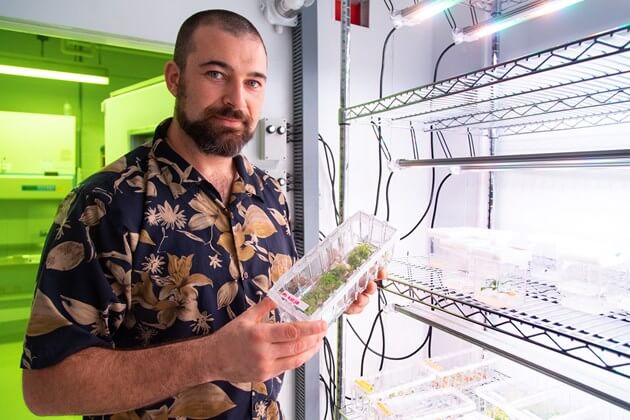Plans for a new Guelph Centre for Cannabis Research are moving forward at the University of Guelph, with a professor researching cannabis at the university hoping ground will break on the project as early as this spring.
The proposed $20 million centre is in the planning stages, with half of the funding committed by Wiisag Corporation, a First Nation cannabis company headquartered in Neyaashiinigmiing, Ont.
“We still don’t have the whole bucket full of cash required to put this infrastructure project in place, but I am still planning on breaking ground in the spring,” said Mike Dixon, professor at University of Guelph.
Currently, students who want to do research with mature cannabis plants have to drive three hours east on the 401 east to a company partnering with the university, said Dixon.
“That will change when we have our own facility and license,” said Dixon.
The proposed 30,000 square-foot building will be two stories plus a basement, with a greenhouse on the roof.
The university is currently appealing to alumni to donate funds toward the construction of the proposed centre.
The centre may eventually research other medicinal plants, said Dixon.
“But in the initial phases we will focus on cannabis, mostly because the cannabis industry sector can afford us,” he said.
Until recently, the university couldn’t grow any cannabis plants on campus. Dixon said the plan is to grow plants to full maturity in the greenhouse that will sit atop the two-storey Guelph Centre for Cannabis Research building, which will be situated adjacent to the university’s current greenhouses.
“We are striving to establish the breeding and production recipe that yields a consistent profile of medical compounds, which is the key to the success of this industry,” said Dixon.
The university recently received a license from Health Canada allowing it to grow cannabis on campus, but it is not allowed to them to grow plants to maturity.
Currently, the university grows cannabis only as tissue cultures, said Max Jones, assistant professor in the department of agriculture.
“There’s a big need from companies for students with relevant experience. Until now, they have been hiring graduates with experience from other crops, which is good, but it’s better to have experience with that specific plant,” said Jones.
Unlike growing from seeds, Jones said growing specimens in vitro with tissue cultures maintain the characteristics of the original plant, which is key to growing and maintaining different strains of the plant.
“If you collect seeds from a specific plant, the seedlings will all be different than that plant,” said Jones.
The plants being grown at the university are for research purposes only.
“We’re not in the business of business,” said Jones. “We develop techniques for companies to produce clean plants.”
Because they are grown in a sterile environment, all of the cells, tissues and whole plants that are grown currently at the university are disease and insect free.
“People really don’t want pesticides applied to their cannabis. The best way to prevent disease is to start with clean plants,” said Jones.
There are a lot of resources on campus like microscopes and other equipment that students can now access, which wouldn’t be practical when travelling to work on plants at partner facilities, said Jones.
“When we are working with companies and we have to go to their facilities, it’s not very practical for graduate students or undergrads. Now that we can do it on campus we can actually give them hands-on experience,” said Jones.
Dixon said a new curriculum is being created to support the new Guelph Centre for Cannabis Research. He hopes both will be ready for new students as early as 2020.
– Forwarded from Guelph Today

